Water Management and Structuration Theory: A Case Study in the Coeur d'Alene, Idaho - Spokane, Washington Region
Daniel, Jessica Renae. (2015). Water Management and Structuration Theory: A Case Study in the Coeur d'Alene, Idaho - Spokane, Washington Region. Theses and Dissertations Collection, University of Idaho Library Digital Collections. https://www.lib.uidaho.edu/digital/etd/items/daniel_idaho_0089e_10627.html
- Title:
- Water Management and Structuration Theory: A Case Study in the Coeur d'Alene, Idaho - Spokane, Washington Region
- Author:
- Daniel, Jessica Renae
- Date:
- 2015
- Program:
- Water Resources
- Subject Category:
- Water resources management
- Abstract:
-
There is a lack of understanding about how the interplay between individual actions and social structures informs water management practices. While Structuration Theory provides a holistic examination of individual and structural levels, it is not robustly applied in water management settings. Such an integrated understanding is critical when water crosses jurisdictions and management responsibilities are fragmented among organizations. This situation exists in the case study area, the Coeur d’Alene, Idaho—Spokane, Washington region. Primary qualitative data were collected through interviews with water management, use, allocation, and protection actors. Snowball sampling generated this interview sample. An interdisciplinary component integrated hydrology, environmental science, and engineering data to contextualize interviews, frame analysis, and provide biophysical information. Results were analyzed with respect to Structuration Theory’s propositions and concepts. Overall, actors realized collaboration’s benefits and held pro-collaborative perspectives, but regulations and institutional arrangements constrained collaboration’s scope. Thus, collaborative behaviors were limited to data collection and sharing, capacity building, and relationship development. Norms, state, tribal, and federal regulations, and the differences between Washington and Idaho water management institutions were important components of the water management system. Even with trends towards collaboration and strategic, context-appropriate management behaviors, social structures informed behavior more than actors affected them. This study demonstrated Structuration Theory’s explanatory value in framing and understanding complex water management systems. This successful application argues for the appropriateness of and need for enhanced empirical use of Structuration Theory within water management research.
- Description:
- doctoral, Ph.D., Water Resources -- University of Idaho - College of Graduate Studies, 2015
- Major Professor:
- Wilson, Patrick
- Committee:
- Coats, Erik; Long, Jerrold; Shrestha, Manoj
- Defense Date:
- 2015
- Identifier:
- Daniel_idaho_0089E_10627
- Type:
- Text
- Format Original:
- Format:
- application/pdf
- Rights:
- In Copyright - Educational Use Permitted. For more information, please contact University of Idaho Library Special Collections and Archives Department at libspec@uidaho.edu.
- Standardized Rights:
- http://rightsstatements.org/vocab/InC-EDU/1.0/

